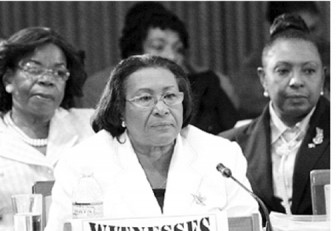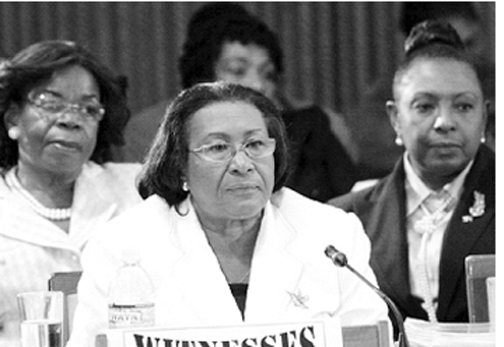(Jamaica Gleaner) Justice Minister and Attorney General Dorothy Lightbourne on Thursday conceded that last year’s public outcry forced her to sign the extradition request for former Tivoli Gardens strongman Christopher ‘Dudus’ Coke.

An impassioned Lightbourne told the Manatt-Dudus commission of enquiry that she did all in her power to ensure Coke’s rights were not breached.
“I did everything to protect the constitutional rights of Mr Coke … but in doing so, I had to reverse my position,” she said under examination from her attorney, Dr Lloyd Barnett.
She said she did not refuse to sign the United States extradition request for Coke, but had sought to highlight the flaws contained in the August 2009 document.
Lightbourne added: “I went to the Constitution and had to look at the public interest … . I was obliged to take into account security, international relations and other matters relating to public interest.”
The justice minister asserted that the matter could have been resolved, but lamented that politics got in the way.
“I signed (the order to proceed), but I do not resile from the view that the request was flawed …,” Lightbourne declared. “All I asked the US to do is to respect our laws. We are small and we are poor, but respect our laws.”
Lightbourne signed the document in May 2010 after a stand-off with US authorities.
She joined her Cabinet colleague, National Security Minister Dwight Nelson, in pronouncing two controversial memoranda of understanding (MOUs) in breach of the Interception of Communications Act.
On an unusually uneventful day, Lightbourne said she was of the view that the MOUs capacity to disseminate wiretapping data to the United States was in breach of the act.
“It would be outside the Interception of Communications Act and, need I say, unconstitutional,” she said.
Former Minister of National Security Dr Peter Phillips, who signed the two MOUs in September 2004 and spent five days in the witness box, maintained that their content was not in breach of the law.
Lightbourne said she shared her concerns with Solicitor General Douglas Leys and his deputy, Lackston Robinson, who both expressed similar misgivings.
She said the concerns were conveyed to the US authorities.
After the exchanges of diplomatic correspondence, Lightbourne said during a meeting at the Office of the Prime Minister, Isiah Parnell, chargé d’affaires for the United States Embassy in Kingston, refused to give her copies of the MOUs when they were requested.
Lightbourne said that as the impasse developed, she asked for advice from Barnett, a noted constitutional lawyer.
“Apart from the advice from the solicitor general, I sought independent legal advice,” she said.
Barnett: “As a result of that, was action filed in the court?”
Lightbourne: “Yes, sir.”
The declaration filed in the Supreme Court sought a declaration that by virtue of the Extradition Act, the justice minister has the authority to, among other things, decline to sign the authority to proceed.
She said the minister was under a duty to deny the request for the authority to proceed if the request was in breach of the law.
The attorney representing the People’s National Party, K.D. Knight, requested a copy of the independent legal advice which was tendered last year by Barnett.
But Barnett said he was not in a position to extend that courtesy, saying he would have to request it from Lightbourne.
After a protracted exchange, commission Chairman Emil George ruled that Knight could not request the document in the middle of Barnett’s examination of his client.
“It is not the proper time to make the application,” said George.
Lightbourne said the court action fizzled as none of the contenders were available and Coke was not served.
In cross-examination, Frank Phipps, the attorney for the Jamaica Labour Party, made much of wiretapping data being kept from Lightbourne when she was asked to sign the extradition request.
He also raised questions about the identity of the police constable allegedly involved in the wiretapping of Coke’s conversation.
Lightbourne said she had not been given a compact disc of the so-called recorded conversations involving Coke.

